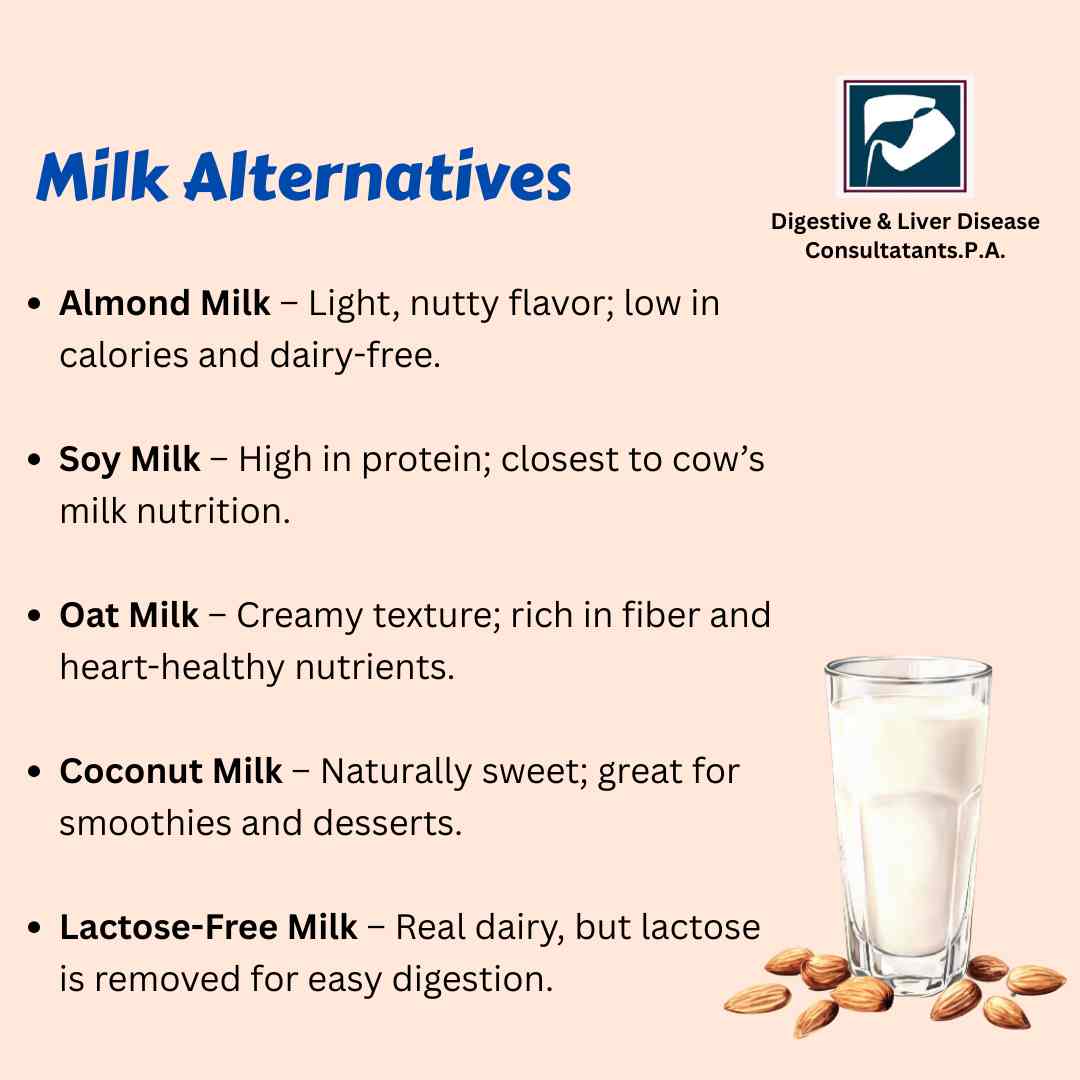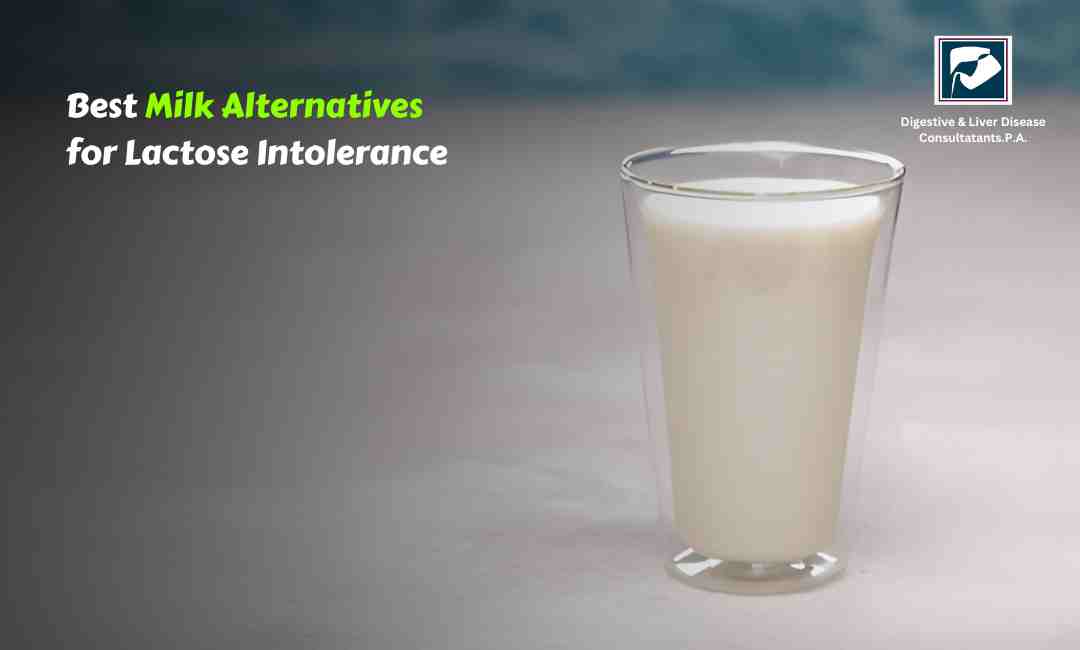For many people, a glass of milk is a daily staple — whether it’s poured over cereal, blended into smoothies, or added to coffee. However, for those with lactose intolerance, drinking regular cow’s milk can cause bloating, gas, stomach cramps, and diarrhea. The good news is that you don’t have to give up milk altogether. Today, there are several healthy milk alternatives available that provide essential nutrients without upsetting your digestive system.
What Is Lactose Intolerance?
Lactose intolerance is a common digestive condition where the body has difficulty digesting lactose — a natural sugar found in milk and dairy products. This happens when the small intestine doesn’t produce enough of the enzyme lactase, which is responsible for breaking down lactose into simpler sugars that can be easily absorbed.
Common symptoms include:
- Bloating
- Gas
- Stomach cramps
- Nausea
- Diarrhea after consuming dairy products
While lactose intolerance isn’t dangerous, it can cause discomfort and affect your daily routine. Choosing lactose-free milk options can help you maintain a balanced diet without triggering these symptoms.

1. Lactose-Free Cow’s Milk
If you enjoy the taste of traditional milk but can’t handle lactose, this is the simplest swap. Lactose-free milk is real cow’s milk that has the enzyme lactase added to it, breaking down lactose into simple sugars like glucose and galactose.
Benefits:
- Same taste, texture, and nutrition as regular milk
- Excellent source of calcium, vitamin D, and protein
- Suitable for cooking, baking, and drinking
Who it’s for:
Anyone who wants the same benefits of dairy without digestive discomfort.
2. Almond Milk
Made from ground almonds and water, almond milk is one of the most popular non-dairy alternatives. It has a light, nutty flavor and is naturally lactose-free.
Benefits:
- Low in calories and fat
- Naturally lactose-free and vegan-friendly
- Often fortified with calcium and vitamin D
- Works well in smoothies, cereals, and coffee
Things to watch:
Some brands may add sugar or flavorings. Choose unsweetened almond milk for a healthier option.
3. Soy Milk
Soy milk is made from soybeans and is one of the closest substitutes for cow’s milk in terms of protein content. It has a mild flavor and creamy texture that make it a great all-purpose alternative.
Benefits:
- High in protein (comparable to cow’s milk)
- Rich in calcium, vitamin D, and potassium when fortified
- Good for cooking and baking
- Heart-friendly, as it contains unsaturated fats
Note:
If you have a soy allergy, opt for other lactose-free options like oat or almond milk.
4. Oat Milk
Oat milk has gained massive popularity in recent years for its creamy consistency and naturally sweet taste. It’s made by soaking and blending oats with water, then straining the mixture.
Benefits:
- Naturally lactose-free
- High in fiber, particularly beta-glucan, which supports heart health
- Often fortified with calcium, vitamin B12, and vitamin D
- Excellent for coffee, lattes, and cereals
Good to know:
Oat milk tends to be higher in carbohydrates than other milk alternatives, which might be a consideration for people managing blood sugar.
5. Coconut Milk
Made from the flesh of coconuts, coconut milk has a rich, creamy texture and a distinct tropical flavor. It’s a great option for cooking, especially in curries, soups, and desserts.
Benefits:
- Dairy-free and lactose-free
- Adds flavor and richness to dishes
- Contains medium-chain triglycerides (MCTs), a type of healthy fat that supports energy levels
Tip:
There are two types of coconut milk — canned coconut milk (used for cooking) and carton coconut milk (used for drinking). For everyday use, opt for the lighter, drinkable version.
6. Cashew Milk
Cashew milk is another nut-based alternative that’s smooth, creamy, and slightly sweet. It’s made by blending cashews with water and straining the mixture.
Benefits:
- Naturally lactose-free and vegan
- Low in calories
- Creamy texture makes it perfect for coffee, smoothies, and desserts
Note:
Like almond milk, cashew milk has less protein than cow’s milk, so be sure to include other protein sources in your diet.
7. Rice Milk
Rice milk is made from milled rice and water. It’s one of the most hypoallergenic milk alternatives, making it ideal for people with both lactose intolerance and nut or soy allergies.
Benefits:
- Dairy-free, soy-free, and nut-free
- Naturally sweet flavor
- Often fortified with calcium and vitamins A, D, and B12
Consideration:
Rice milk is higher in carbohydrates and lower in protein, so it might not be the best choice for diabetics or those needing more protein.
How to Choose the Right Milk Alternative
When selecting the best milk alternative for your lifestyle, consider:
Nutritional needs: Choose fortified versions with calcium, vitamin D, and B12.
Dietary preferences: Pick plant-based options if you follow a vegan diet.
Allergies: Avoid nut-based milks if you’re allergic to nuts.
Taste and texture: Try different varieties to see what works best for your recipes and drinks.
If you’re unsure which alternative suits you best, consult a gastroenterologist or dietitian to make an informed choice that fits your digestive health.
Maintaining Digestive Health with the Right Choices
Switching to lactose-free or plant-based milk can ease digestive discomfort and improve gut health. But remember, lactose intolerance doesn’t mean you must avoid all dairy products. Many people can still enjoy small amounts of yogurt or cheese without symptoms, depending on their individual tolerance level.
About Digestive & Liver Disease Consultants, P.A.
At Digestive & Liver Disease Consultants, P.A., we are committed to helping patients achieve better digestive wellness through advanced care, personalized nutrition guidance, and modern diagnostic techniques. Our team of experienced gastroenterologists in Houston, Texas, specializes in treating conditions like lactose intolerance, IBS, liver diseases, acid reflux, and other digestive disorders.
We focus on comprehensive digestive care — from accurate diagnosis to customized treatment plans that help you live symptom-free.
Conclusion
Finding the best milk alternative for lactose intolerance depends on your taste, nutrition goals, and dietary needs. Whether you prefer almond milk for its light texture, soy milk for protein, or oat milk for its creaminess, there’s a lactose-free option for everyone.
If you suffer from bloating, gas, or discomfort after drinking milk, it’s time to consult a digestive specialist.
Schedule an appointment with the experts at Digestive & Liver Disease Consultants, P.A. today to understand your digestive health better and discover the right solutions for a comfortable, balanced life.






